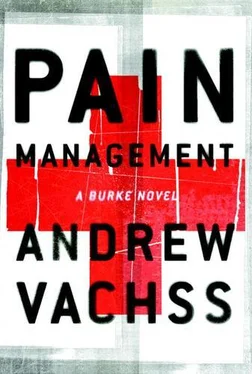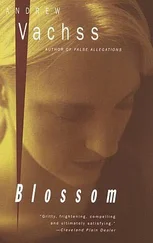“What does Daisy call her?”
They looked at each other. Neither one answered me.
“You still have the note?” I asked the wafer of space between where the husband and wife sat on the love seat.
The husband got up without a word. I watched him walk away. Toward the garage . . . or maybe his studio above it.
He was back in a couple of minutes. Walked over to where I was sitting and handed it to me.
It was on one of those blank music sheets, written in perfect calligraphy, the words fitted neatly between the ruled lines. I tilted it against the light. Ink-on-paper, sure, but it was a computer font, not handwriting:
I went to find the Borderlands. I’ll be back when I learn enough.
It was signed R♥B.
“Nothing else?” I asked them.
They both shook their heads.
“You don’t like the police being involved, right?” I put it to the husband.
“No, I don’t. I never liked the idea. If it wasn’t for . . . my wife,” he said, nodding in her direction, “I wouldn’t have notified them at all, to be honest.”
When people make a point of telling you they’re being honest, pat your pocket to make sure your wallet’s still where it should be.
“Then why—?”
“The authorities,” the woman said. “If we didn’t let them know, we could end up . . . suspects or something. Isn’t that true?”
“It is,” I confirmed for her, watching the self-satisfaction briefly gleam in her eyes. “But if the cops saw that note, they’d make you report her missing, maybe even file a petition against her in court.”
“Court?” the husband said sharply. “What the hell is that all about?”
“Your daughter’s a minor. About sixteen, yes?”
“She’ll be seventeen in September,” the wife said.
“Sure. Anyway, if she’s running around unsupervised somewhere with your permission, that could look like neglect to the law. Unless you’re in contact with her, sending her money . . .”
“No,” they both said in unison.
“But if she’s gone with out your permission, and if you want the law to bring her back, you’d have to file a petition so she could be brought back against her will, understand?”
“I would never go to court against my own—”
I held up my hand like a traffic cop. I was there to get some leads, not listen to a discourse on the philosophical perspectives of the privileged. “What else do you have that might help?” I asked them.
The husband showed me a dollhouse he’d built for his daughters. “Well, it was originally for Buddy, but by the time Daisy was old enough to be interested, Buddy had pretty much outgrown it anyway.”
The dollhouse was ultra-modern, almost futuristic. It was as precise and substantial as a miniature of the real thing, but it didn’t have the warmth of Rosebud’s rolltop desk. Didn’t look as if anyone had ever played with it, either.
I stayed for dinner, some quasi-Oriental dish, heavy on the presentation. Afterwards, the husband offered me a joint.
“I’ll pass,” I told him.
“You have problems with marijuana?” he asked, a faint trace of belligerence in his voice.
“By me, it’s just an overpriced herb, a hell of a lot less dangerous than booze.”
“Exactly right,” he approved. “But even in an ‘enlightened’ state like Oregon, it’s still a crime to possess it, except for medical reasons.”
“Yeah, well—”
“We’ve been smoking for . . . how many years, Mo?”
“ You’ve been smoking for decades,” his wife said. “And I have asked you a million times not to call me that.”
“Excuse me, Mau reen, ” he said.
Apparently, the secondhand ganja hadn’t mellowed out their relationship. From the way Daisy didn’t react, the exchange was nothing new to her.
“Did Rosebud . . . Buddy . . . smoke?” I asked.
“No,” said the mother.
“Once in a while,” said the father.
“She didn’t like it,” Daisy added.
I took notes—I don’t need to write things down, but it always makes clients feel better—while the father filled me in on his missing daughter’s life. If she’d had a boyfriend, either it escaped his attention or he didn’t see fit to share the info with me.
By then, I knew who would know, but I could see I wasn’t going to be alone with her again on that visit.
I didn’t leave until almost ten at night. Felt like I had been vacuuming for hours, but without a lot of suction.
Before I left, they gave me a couple of photos of their daughter. She was a medium-built girl with long straight hair and a crowd face. Not a single scar, tattoo, blemish, or disfigurement to set her apart. The shots weren’t candids; she looked at the camera stiffly—not unhappy, not even bored; just . . . composed. Maybe it was the bland expression that made her look so generic.
I got up, carefully slid the photos into my jacket.
“I’ll walk you out,” the husband said. His wife was looking straight ahead. Not at me. Neither of us said goodbye.
Outside, in the night, I cupped my hands around a wooden match, fired up a cigarette, giving him time to say whatever he wanted to. I don’t smoke anymore, but I never go out without a pack. They cost so much today, because of the piety taxes, that they’re good for mini-bribes. And it’s always smart to let people think you have habits that you don’t.
“Buddy is a good girl,” he said quietly, as if he’d thought about it carefully before pronouncing his opinion.
“Okay.”
“I mean it.”
“Sure. What difference?”
“I don’t understand. I was just trying to—”
“You don’t know where she is, right?”
“No. Of course not.”
“So I have to look around, understand? There’s no special place where good girls wouldn’t go. You’re not narrowing down my search any with that.”
“Well . . . I just meant, I mean, Buddy doesn’t use drugs. Wouldn’t that be a help for you to know, for example?”
“You know why she took off?”
“No. We told you—”
“So how can you be so sure about the drugs?”
“I . . . All right, I get your meaning.”
“Okay. I’m on the job.”
“You don’t sound very optimistic.”
“I don’t want to get your hopes up. Your daughter seems like a very intelligent, very organized young woman. She could be a hundred places by now.”
“She’s around here,” he said, certainty in his voice. “I’m sure of it.”
“Up to you. Me, I’m on the clock. You know the rate, you decide when I’ve been out there enough.”
“Can I have one of those?” he asked, nodding his head at my cigarette.
I gave him one, handed him my little box of matches. His hands were steady.
“Mr. . . . ?”
“Hazard. B. B. Hazard. That’s the name I gave your daughter.”
“My . . . Oh! You mean Daisy.”
“Yeah. She’s a little pistol, that one.”
“She is that. Buddy spoiled us. No notes from her teachers, no disciplinary problems at school . . .”
“Daisy and her are different personalities?”
“Night and day,” he assured me. “Uh, what I wanted to . . . discuss with you . . . when you find her, what do you do?”
“There’s a few options.”
“Such as . . . ?”
“I could try and get an address, turn it over to you. I could brace her, try and talk her into coming home. Or at least into giving you a call, let you try the persuasion. . . .” I let my voice trail off, giving him the opening if he wanted it.
“Suppose she . . . refuses to come back. Is there anything you could do then?”
“I could bring her back,” I said flatly, no emphasis anywhere.
Читать дальше











